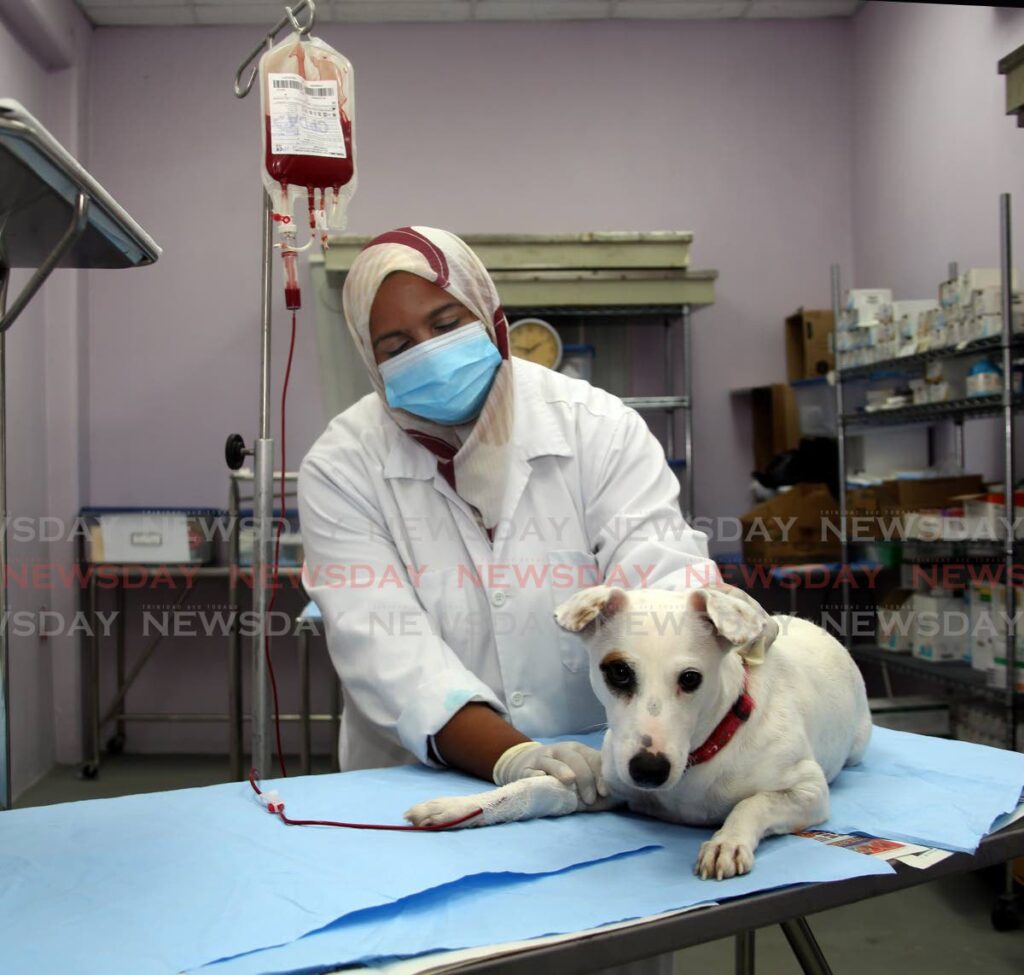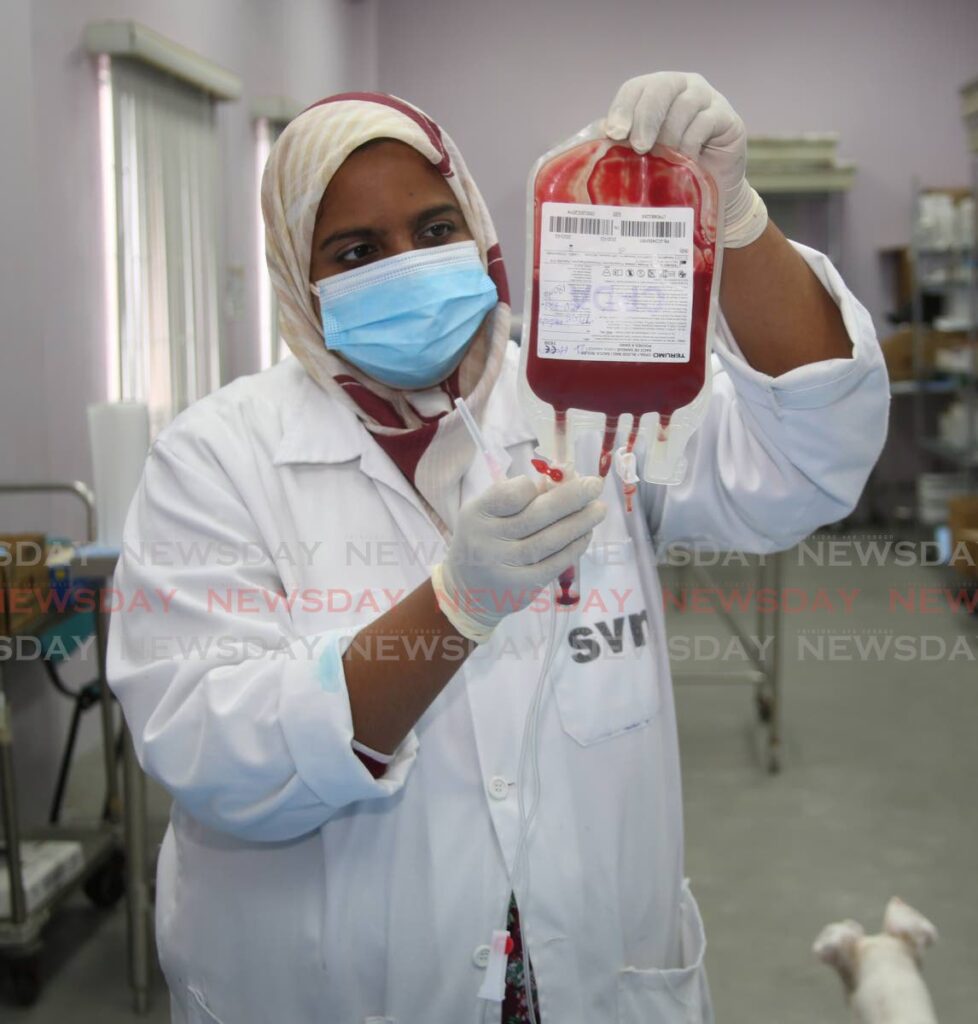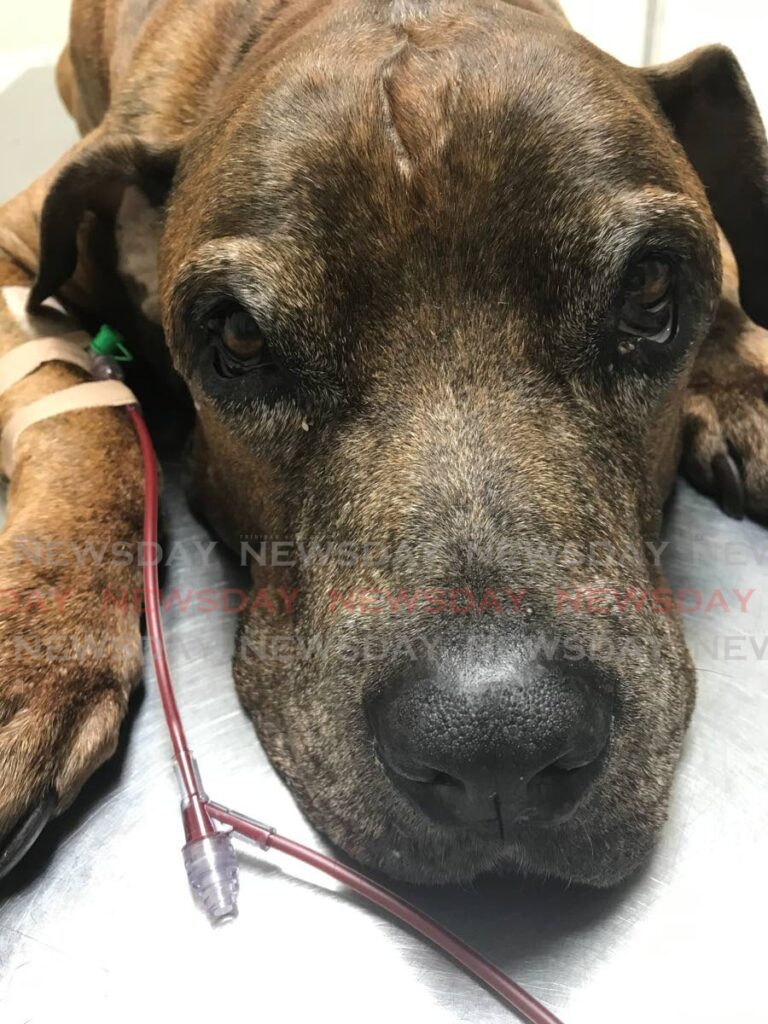Mt Hope vet school: Blood transfusion can save your dog's life

Last December, Rambo, my 12-year-old brindle pitbull, seemed to be heading for his annual Christmas turkey dinner. Then, about a week before the holiday, he appeared listless.
An emergency visit to his veterinarian, Dr Mark Adam, proved baffling. No diseases turned up in his tests. He didn’t have tick fever or an autoimmune deficiency disease, but his blood count was dangerously low.
On Christmas Eve, Rambo received an emergency blood transfusion from a rescued pitbull that lives at the Jones Veterinary Clinic in La Seiva, Maraval.
Dogs in need of blood transfusions can also have this procedure at Mt Hope’s School of Veterinary Medicine (SVM) blood bank, established in March 2020 by Dr Ansarah Hosein.
“I saw the need for establishing a blood bank or blood donor programme because we often had animals that required transfusions – at least one every week,” said Hosein. “Having the blood readily available can be life-saving, and it can shorten the time to recovery.”
Hosein and Dr Sabrina Thomas run the Mt Hope-based blood bank. Both did MSc degrees at the Ontario Veterinary College, University of Guelph, Canada, where there was an established blood bank.
“While I was there, I consulted with the specialists to find out what was needed to set up the blood bank,” said Hosein. “We started with basic equipment: a refrigerator, a scale and the ability to screen donors with bloodwork. We intend to expand into blood products such as packed red cells and possibly feline blood in the future.”
There are many reasons for animals to have blood transfusions, and they are commonly done too on cats, horses, goats, sheep and cattle.
A blood transfusion becomes necessary when a dog’s packed red-cell volume drops to 20 per cent or lower. This can occur in kidney disease, cancer or blood parasites spread by ticks, which cause a disease called tick fever.

Vets always do bloodwork before surgery so they will know if a dog’s blood count is at an acceptable rate before procedures. Some need blood transfusions to be stabilised before surgery. Others might have had severe blood loss through an accident.
Dogs that have had a splenectomy (removal of the spleen) or a form of cancer that must be operated on might also need a transfusion.
When patients are severely anaemic, like Rambo, their organs don’t receive enough oxygen. If an intervention does not occur quickly, organ failure can ensue, and the dog will die.
The process of screening a donor and collecting blood for a transfusion can take eight-48 hours. Blood is collected through a jugular vein. The actual collection from the donor takes about 30 minutes.
“Our blood bank currently only stocks canine blood,” said Hosein. “The large animal and equine sections of the SVM do blood transfusions on goats, most often, but also on sheep, cattle and horses.
“We have not done any blood transfusion in a cat as yet, because more equipment for typing their blood is necessary and small units for collection would be needed.”
About 90 blood transfusions for dogs have been done at Mt Hope since the start of the blood bank.
“I remember having a puppy patient with parvovirus that had lost a lot of blood through the intestines. A small amount of blood can make a huge difference for an anaemic puppy.”
In this case, a blood transfusion saved the puppy’s life.
“It was very rewarding when the puppy felt well enough to get back to being a puppy after the transfusion,” said Hosein.
“I also saw another case where a dog was fed a diet cooked with excessive amounts of powdered garlic. Garlic and onion can cause anaemia in dogs and cats. This patient was also saved by the blood transfusion and correction of the diet.”
Patients needing blood transfusions can be referred to the hospital by private vets.
“We also provide blood to private veterinarians upon their request; which they can then administer in their clinic,” said Hosein. “Patients at the Mt Hope Veterinarian hospital are given transfusions once their attending veterinarian deems it necessary and has obtained consent from the animal’s owner.”
There is a fee for the service to cover the expense of donor screening and transport. The SVM laboratory can do a cross-match of two potential donors, with one recipient, the patient, receiving blood. Dogs that have had a previous transfusion must have a cross-match done, as the second transfusion requires matching blood types. Blood can be kept in the blood bank for 28 days.
Some dogs develop an allergic reaction to blood transfusions.
“Allergic reactions usually occur in the first 15 minutes of the transfusion. The blood is given slowly, and the transfusion is given over a four-hour period.”

Rambo developed an allergic reaction during his transfusion. Dr Katrina Annamunthodo, who monitored him during his transfusion, administered an intravenous steroid when intense itching and slight swelling around the lips occurred. Sometimes a dose of epinephrine must be administered.
The transfusion gave Rambo’s vets an additional week to investigate his problem.
“Oftentimes transfusions are given to stabilise the dog while other diagnostic tests are being done,” said Annamunthodo.
This was the plan of action for Rambo, but his health plummeted dramatically a week afterwards. He was euthanised on Old Year’s Day.
But blood transfusions are often lifesaving procedures for animals.
Benefits for blood donors at SVM include a free health screening, including extensive bloodwork, an annual vaccination and subsidised tick and flea prevention medication. After the donation, dogs usually get a can of tinned meat for a treat. They are able to walk back to their kennels.
Dogs need to fall between the ages of one and seven, be in good health, weigh over 30 kg, have a good temperament, no current illnesses, no ectoparasites, be dewormed, heartworm-negative and have their vaccinations up to date.
Your pet can save another dog’s life. You can enrol your dog as a blood donor at the School of Veterinary Medicine’s Blood Bank by contacting Dr Hosein at ansarah.hosein@sta.uwi.edu.


Comments
"Mt Hope vet school: Blood transfusion can save your dog’s life"